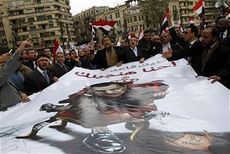 In a few weeks, the World Bank will issue its Development Report, a document of
canonical importance to the DfiDs of the world. But the recent events in Egypt will make it useful reading for laymen too. The reason: it shows empirically – having looked at hundreds conflicts in
hundred of countries – that young democracies are much more vulnerable to conflict than either mature democracies or authoritarian states.
In a few weeks, the World Bank will issue its Development Report, a document of
canonical importance to the DfiDs of the world. But the recent events in Egypt will make it useful reading for laymen too. The reason: it shows empirically – having looked at hundreds conflicts in
hundred of countries – that young democracies are much more vulnerable to conflict than either mature democracies or authoritarian states.
This means that when fostering transition, the international community encounters faces a dilemma: do we push for stability, or do we push for democracy? We may not be able to get both, in the short term. In the long term, democracy is more stable than authoritarian rule. But in the short term, there are sharp trade-offs that have to be confronted. Do we want a (temporarily) stable and repressive Egypt, or a democratic but turbulent one?
I’m clear that we should support liberty – and try to manage the risks of turmoil downwards. With the departure of President Hosni Mubarak, only the initial stage of Egypt’s transformation will have been achieved. What follows is key and the international community – East and West – would do well to start planning what it might offer the country in the days and months ahead.






Comments